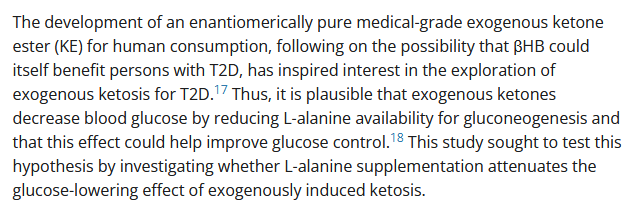This paragraph confused me:
On the contrary, in type 2 diabetes (T2D), excessive gluconeogenesis underlies hyperglycemia. Thus, one could predict that βHB, by inhibiting gluconeogenesis, could help manage hyperglycemia in T2D. Consistent with this hypothesis, ketogenic diets have been shown to effectively reverse T2D and, while most of the benefit of ketogenic diets in T2D likely comes from carbohydrate reduction, it is not yet clear to what degree βHB itself might play a supporting therapeutic role. In fact, in both animals and humans, exogenous βHB are alone sufficient to decrease blood glucose.
How does excessive gluconeogenesis occur in someone eating a high amount of carbohydrate? Surely the insulin response to the carb intake would inhibit gluconeogenesis. My understanding is that glucagon can cause runaway gluconeogenesis only in conditions of low insulin, which is the case only in the very late stages of untreated Type II diabetes, which in the earlier stages is a problem of hyperinsulinaemia, not hypoinsulinaemia.
Second, the processes of ketogenesis and gluconeogenesis are both stimulated by glucagon, no? Although, come to think of it, when the insulin/glucagon ratio is low, there are other factors besides insulin that regulate gluconeogenesis, so I suppose one of them could be β-hydroxybutyrate. I’d like to see a study of high-carb and keto-adapted subjects done, and see what the results are.
Third, β-hydroxybutyrate does not inhibit gluconeogenesis in Type I diabetes, since the diagnostic for diabetic ketoacidosis is hyperglycaemia combined with serum β-hydroxybutyrate > 10.0 mmol/dL. The authors of the paper don’t explain how that works, and I think it’s relevant.
I’m also wondering why the study focused only on β-hydroxybutyrate and ignored aceotacetate and acetone. It would be interesting to know what their role in all this is.

